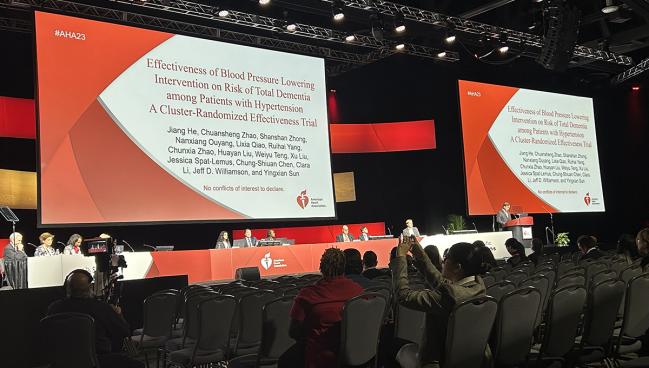Intensive BP Reduction Lowers Dementia Risk in China Rural Hypertension Study
The findings, from a cluster-randomized trial, bolster what clinicians have believed based on observational data.

PHILADELPHIA, PA—A community intervention aimed at aggressively lowering blood pressure not only improves hypertension control but also reduces the risk of dementia, according to the 4-year follow-up of the China Rural Hypertension Control Project.
Over that span, the intervention provided a large, sustained reduction in BP accompanied by an annual rate of all-cause dementia of 1.12%, significantly lower than the 1.31% rate observed in patients managed with usual care (HR 0.85; 95% CI 0.76-0.95), Jiang He, MD, PhD (Tulane University School of Public Health & Tropical Medicine, New Orleans, LA), reported here at the American Heart Association 2023 Scientific Sessions.
There was also a significantly lower annual rate of cognitive impairment without dementia (4.19% vs 5.02%; HR 0.84; 95% CI 0.80-0.87).
“This proven-effective intervention should be widely scaled up to reduce the global burden of dementia,” He said.
Serving as the discussant following He’s presentation, Daniel Jones, MD (University of Mississippi Medical Center, Jackson), said, “This is importantly the first definitive evidence of dementia risk reduction demonstrated in a randomized controlled clinical trial,” supporting the strong relationship between BP and dementia risk seen in observational studies.
Of note, a substudy of the SPRINT trial failed to demonstrate a significant reduction in the risk of probable dementia with intensive BP-lowering.
In that context, Jones said, this is a “world-changing set of data. As dementia grows around the world, to now know that we have a tool for prevention of dementia is overwhelming.”
The China Rural Hypertension Control Project
It’s estimated that the number of people with dementia around the world will balloon in the coming decades, from about 57.4 million in 2019 to 152.8 million in 2025, He said, adding that because there are no proven cures for dementia, primary prevention remains a public health priority. Hypertension control is a potential preventive strategy, although that had not previously been shown in a randomized trial to have a significant impact.
The China Rural Hypertension Control Project, a cluster-randomized trial that included 33,995 patients (mean age 63 years; 61% women) living in 326 villages in three provinces, provided the patient numbers and length of follow-up to change that. As previously reported by TCTMD, intensive BP-lowering delivered by village doctors—community health workers with basic medical training overseen by physicians—provided a large increase in the proportion of patients who had their hypertension under control at 18 months compared with usual care. That was sustained at 3 years, with the intervention associated with a 31% reduction in cardiovascular events.
The investigators extended follow-up to 4 years to look for an impact on dementia and cognitive impairment, with trained and certified neurologists performing various neuropsychiatric and other assessments.
As shown at earlier time points, patients in the intervention group maintained substantially lower BP compared with those in the usual-care arm, with an average systolic reading that was 22.0 mm Hg lower and an average diastolic reading that was 9.3 mm Hg lower. The proportion of patients with BP controlled to below 130/80 mm Hg was markedly higher (67.7% vs 15.0%; P < 0.0001).
The primary outcome of the 4-year analysis was all-cause dementia, as defined according to recommendations from the National Institute on Aging – Alzheimer’s Association work groups on diagnostic guidelines for Alzheimer’s disease. The lower rate observed in the intervention arm was consistent across subgroups defined by age, sex, education level, cigarette smoking, body mass index, systolic BP, and fasting plasma glucose at baseline.
Intensive BP-lowering also was associated with lower rates of cognitive impairment without dementia, a composite of dementia or cognitive impairment, a composite of dementia or death, and serious adverse events. Rates of injurious falls and syncope requiring medical attention were no different between groups.
Better to Start Early?
For Eugene Yang, MD (University of Washington, Bellevue), chair of the American College of Cardiology’s council on the prevention of cardiovascular disease, the results are not unexpected considering the observational data linking BP to neurocognitive changes and dementia.
Coming from a randomized trial, however, the findings “really help to solidify what we already had believed,” he told TCTMD.
Yang said that even though the overall impact on dementia appeared to be modest, there were hints in the subgroup analysis that patients younger than 69 derived a greater benefit than their older counterparts (HR 0.78 vs 0.93, without a significant interaction). That suggests that if intensive BP-lowering is going to reduce the risk of dementia, it might be better to get started earlier on before hypertension-induced damage is too great, he said.
Jones said it will be important to replicate these findings, which have not yet been through intensive peer review. There are also open questions, he noted, about whether intensive treatment can be expected to improve all types of dementia; the role of BP in the pathophysiology of various forms of dementia; and whether treatment from an earlier age can, in fact, reduce or even eliminate risk of dementia.
Todd Neale is the Associate News Editor for TCTMD and a Senior Medical Journalist. He got his start in journalism at …
Read Full BioSources
He J. Effectiveness of blood pressure lowering intervention on risk of total dementia among patients with hypertension: a cluster-randomized effectiveness trial. Presented at: AHA 2023. November 11, 2023. Philadelphia, PA.
Disclosures
- The CRHCP was supported by the Ministry of Science and Technology of China.
- He and Jones report no relevant conflicts of interest.





Comments